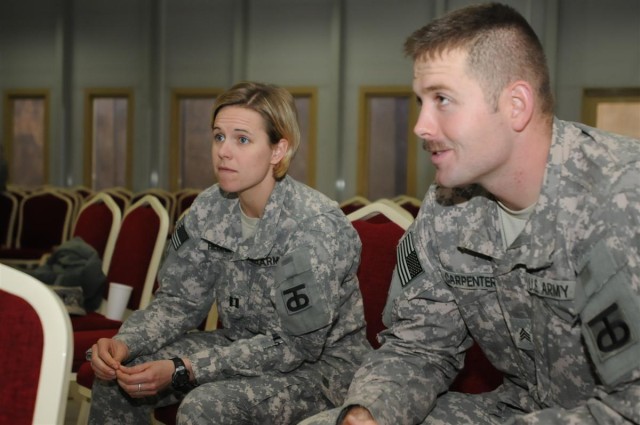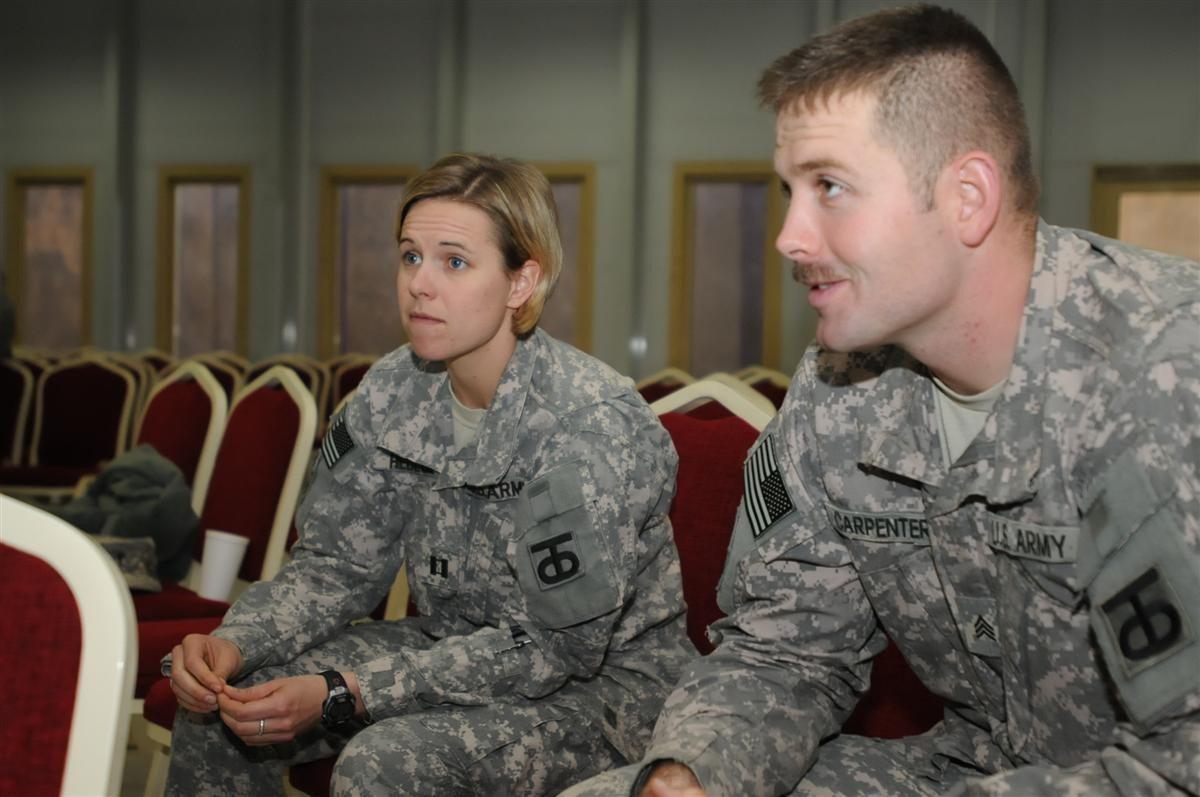
JOINT BASE BALAD, Iraq - Soldiers practiced conversing with suicidal Warfighters in mock scenarios during suicide intervention training Dec. 1 through Dec. 4 at Joint Base Balad, Iraq.
The 13th Sustainment Command (Expeditionary), out of Fort Hood, Texas, held a 13th ESC Resiliency Counseling Training Conference for chaplains and chaplain assistants, to educate unit ministry teams in applied suicide intervention skills training and warrior/chaplain resiliency training, said Master Sgt. Michael I. Bair, the command chaplain noncommissioned officer in charge with the 13th ESC.
"We brought all the chaplains and chaplain assistants in from all across Iraq, so that we can give them a little bit of downtime," said Bair, a Fredericksburg, Va., native. "During the downtime ... (we) give them some tools to put into their tool chest, to help them be more resilient and help their Soldiers do the same.
"I provide mentoring training for all the chaplains and the assistants spread all across the country."
Bair said sometimes chaplains can forget to slow down here in the Iraqi theater.
"Chaplains can't forget that they can't go 100 mph all the time because we're in this for the long haul," he said. "This isn't a sprint."
Lt. Col. Roy T. Walker, command chaplain with the 13th ESC and an Elizabethtown, Ky., native, said chaplains work long hours to help Soldiers and often forget to care for themselves.
"We want to give (them) the tools to recognize when they're burning out," he said. "We want to give them tools to also recognize when others are burning out."
The break from the daily grind served as a first step in these Soldiers' suicide intervention training, said Walker.
ASIST is one of the leading forms of suicide intervention, he said.
"We want to make sure that everyone here recognizes signs and symptoms," said Walker. "We don't want to assume that we all have some historical knowledge because we're made up of Guard, Reserve and (active-duty Soldiers). What one of us may have had, the others may have not."
Walker said the 13th ESC commander requires all chaplains and chaplain assistants to receive T2, the most basic level of training, to help them recognize signs and symptoms of suicidal service members and know when and how to intervene. The next level of training, T4, includes training the trainer, allowing the chaplains or chaplain assistants to spread their knowledge about suicide prevention, he said.
In the final level, chaplains and chaplain assistants become master trainers - hosting seminars and workshops.
Walker said the chaplains and chaplain assistants have collaborated with the mental health community to help Soldiers. Soldiers can come to chaplains and chaplain assistants with confidential issues and those issues will remain private unless Soldiers pose a threat to themselves or someone else, he said.
For clinical issues, Soldiers are referred to the Combat Stress Control.
The chaplains and chaplain assistants learn during the ASIST training when to have Soldiers seek help or when those Soldiers need someone to listen, or give a little advice, said Walker.
"We learn the training and we take it back to our units," he said.
Lt. Col. James H. Finn, a chaplain with the 118th Multifunction Medical Battalion out of Newington, Conn., said the group gained camaraderie in addition to resilience from this training.
"It helps us get to know the other chaplains that are out in the field, in different areas where our Soldiers might be," he said. "So we can trust one another and network together as teams."
Finn said networking among ministry teams helps Soldiers spread knowledge about intra-theater issues.
"I think the most important thing is for people to trust their chaplains and trust their leadership," he said. "If they don't feel confident in their leadership, that is the time to go and talk to either a chaplain, or combat stress or somebody else you can trust.
"That's the most important thing from all levels, general down to the private, (is the) need to communicate. If we're not communicating, then we're affecting our own mission and impacting the Soldiers around us. If one Soldier speaks out and they're having problems, maybe another Soldier is thinking about hurting themselves or hurting somebody else."

Social Sharing